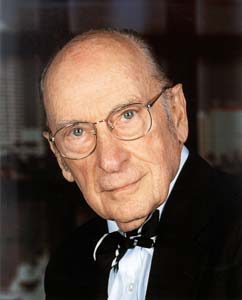
1971 – Irving R. Levine begins to cover economics and business for NBC News.
Irving R. Levine’s first job in journalism was for the Providence, R. I., newspaper, but by 1950 he was in Vienna reporting European stories for the International News Service. When the Korean Ware broke out, he volunteered to cover it, and while there began sending stories to NBC News. The network hired him full time in 1952 and sent him back to Europe. In 1955, he became the first network reporter accredited by the Soviet Union. Levine later worked as a foreign correspondent in Tokyo, Rome and London, and by 1971 wanted to cover the State Department. But the executives at NBC News asked him to cover economics and business instead. Levine shuddered. “It was a barren time,” he said. “Producers just weren’t interested in those stories.”
Still, Levine was the first network correspondent to cover economics full time, and he reported on issues such as the recession, taxation, tariffs and money that affected everyone. Although they were often dense topics, Levine explained them to his audience in a way that they could understand. Noted Lissit, “He’s often called to enlighten a television audience that has a limited background in such subjects. He’s grabbed so much air time over the years that a CBS News president once said all NBC had for correspondents was a bunch of guys named Irving.”
Balding and wearing a bow tie, Levine made covering economics an essential part of broadcast television. In the 1970s, there was a period of inflation and stagnant business growth as well as rising unemployment. The stock market had also fallen in the early part of the decade. Because of the inflation, consumers began to purchase more products because they were afraid of future price hikes, pushing up prices even further because of the demand. And then the first gas shortages arrived, leading to long lines at the pump. Levine was on the news virtually every night, explaining these issues and how they influenced the amount of money viewers had in their wallets or pocketbooks.
Levine first had trouble getting stories about the economy on NBC Nightly News. “I told him if he could make me understand them, the viewer would too,” said Christie Basham, who was the show’s Washington producer in 1971. “And he did. He taught me economics.”
Levine’s break came when President Richard Nixon instituted price and wage controls on Aug. 15, 1971. When the oil embargo raised gasoline prices, Levine often began leading the evening news show. He ended up following five presidents to economic summit meetings around the globe and reporting back on their significance to American viewers, and he also accompanied a delegation from the U.S. Treasury Department to China to cover trade talks.